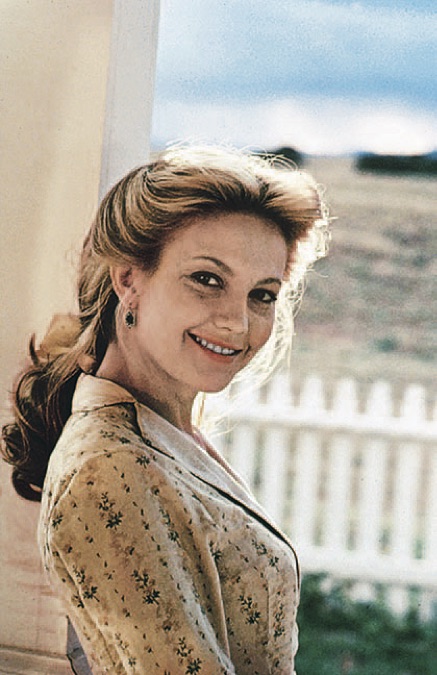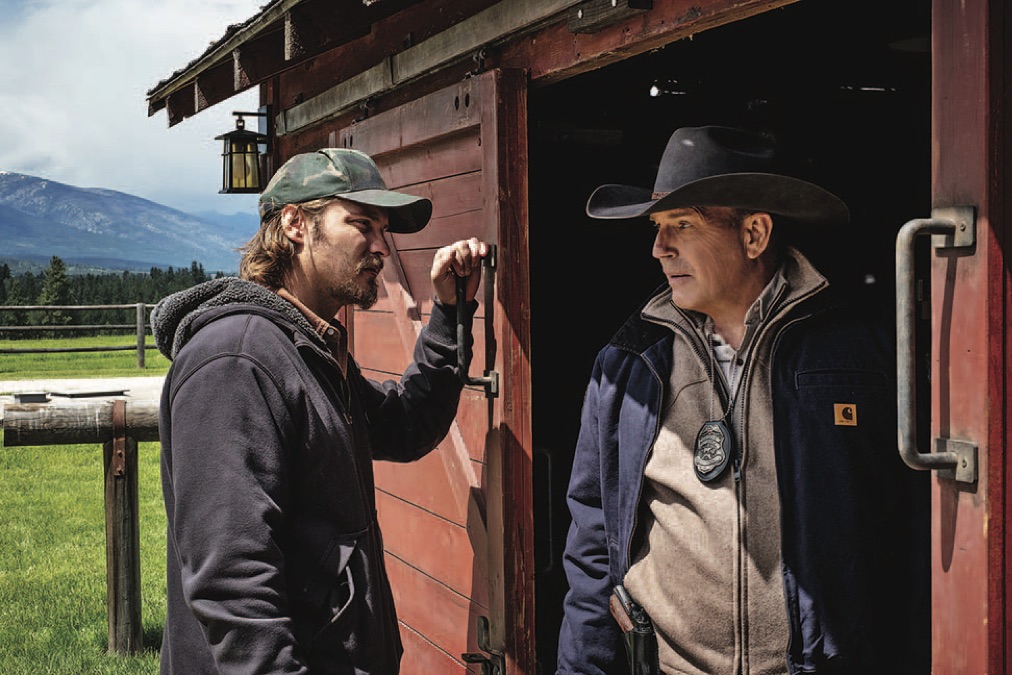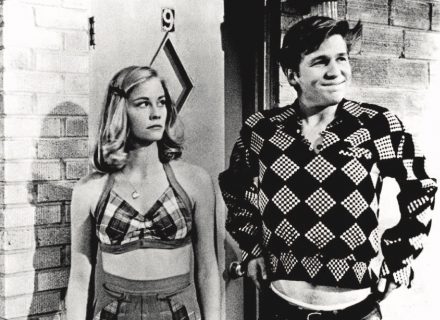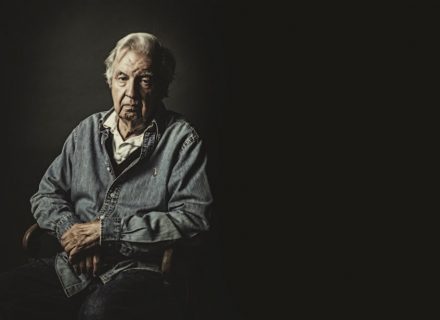Diane Lane and Kevin Costner set out on a dangerous Western journey in the gripping new thriller Let Him Go.
Call Let Him Go a slow-burn thriller and you won’t be far off the mark.
Indeed, the fuse is lit as early as the opening scenes, during which even the commonplace activities of a daily routine feel infused with a sense of unease, if not dread. George (Kevin Costner) and Margaret Blackledge (Diane Lane) appear at ease with each other in the kitchen of their 1950s Montana farmhouse, tending to morning chores. But there is unmistakable tension between Margaret and Lorna (Kayli Carter), her daughter-in-law, whom she criticizes for being insufficiently attentive to her infant son, Margaret’s grandson. And while their son, James (Ryan Bruce), seems confident and competent as he sets out on a ride around their spread, Margaret and George immediately fear the worst when his horse returns without him. Sure enough, when George rides out to find him, he finds his son dead, the result of a tragic accident.
Flash forward three years or so. Lorna marries Donnie Weboy (Will Brittain), a seemingly rootless fellow who obviously doesn’t impress George and Margaret. Still, the Blackledges do their best to remain on good terms with the younger couple, if only for the sake of their grandson. Even when Margaret sees Donnie mistreating little Jimmy (played alternately by Bram and Otto Hornung) and striking Lorna, she says nothing to George — who, not incidentally, just happens to be a retired sheriff.
But then comes the day when Donnie, Lorna, and Jimmy move out of their apartment without alerting the Blackledges and head off to points unknown. At first, George responds with typical stoicism: “Sometimes that’s all life is, Margaret. A list of what we’ve lost.” But Margaret won’t be appeased so easily. One way or another, with George’s help or not, she will pursue the younger couple and reunite with her grandson.
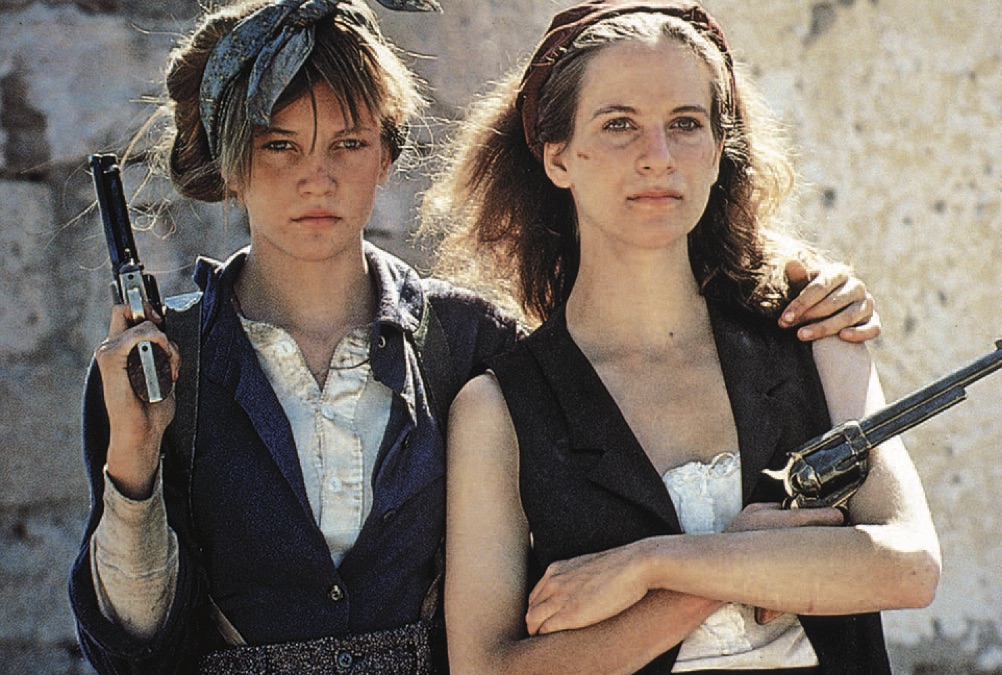 Diane Lane's previous western work includes Cattle Annie and Little Britches (above) and Lonesome Dove.
Diane Lane's previous western work includes Cattle Annie and Little Britches (above) and Lonesome Dove.
Keep this in mind: All of what you’ve just read is simply the setup for Let Him Go, a gripping drama that slowly, steadily builds suspense as the Blackledges track their grandson to an off-the-grid household in the Dakotas that is ruled with a whim of iron by Blanche Weboy (Lesley Manville), a fiercely insular matriarch with implacable ideas about family ties, and a group of offspring ready and eager to do her bidding. After a certain point in the film, the audience can’t help worrying that something terrible may happen at any moment — unless something worse happens first. When bad things ultimately do happen, they come as shocks, but not surprises.
Based on an acclaimed novel by Larry Watson, Let Him Go is a striking change of pace for writer-director Thomas Bezucha, whose previous credits include Big Eden (2000), a sweet-natured romantic comedy about a gay New York artist (Arye Gross) who finds his neighbors are surprisingly supportive when he return to his small Montana hometown, and The Family Stone (2005), a well-received dramedy in which an uptight Manhattan executive (Sarah Jessica Parker) is shoved out of her comfort zone by the rambunctiously bohemian parents (Diane Keaton, Craig T. Nelson) and family of her fiancé (Dermot Mulroney).
More important, it’s also a showcase for another exceptional performance by the formidably versatile Diane Lane, whose credits range from teenage roles opposite Laurence Olivier (A Little Romance), Burt Lancaster (Cattle Annie and Little Britches) and Kenny Rogers (Six Pack) to demanding adult parts in such films and TV dramas as Unfaithful, Under the Tuscan Sun, Secretariat — and, of course, the epic miniseries Lonesome Dove.
We caught up with Lane by phone during the pandemic lockdown to talk about her compelling performance as a woman driven to extremes to save her grandson in Let Him Go. Here are some highlights from our conversation.
Cowboys & Indians: Whenever an actor plays a role as emotionally demanding as Margaret Blackledge, they must really have a lot of trust in their director, so they’ll know they’re in safe hands as they take risks. How did Thomas Bezucha earn your trust?
Diane Lane: Great question. In this case, I could see evidence of emotional intelligence in his previous work. I thought, Oh wow, he’s got a tremendous amount of heart, and I bet he’s going to bring that to whatever story appeals to him next. I feel like he is a wonderful student of humaneness.
And when we met, I could see he’s so well-spoken and he’s so well-read. I have had experiences in the past where I just adore a director in terms of being in their presence. But then when you’re working under them, a whole other character comes out on a film set. Once they don the leadership cap, for some reason, other elements of their personality come out. But I will say that Tom remained like a Stoic Angel guarding the priorities of our story getting on film.
C&I: You were working on a tight schedule and a limited budget. Did that place additional pressure on you during production?
Lane: Every experience has its obstacle course. In hindsight, it’s always a miracle that a film gets made. Sometimes daily, it’s a miracle. I mean, while we were filming up in Calgary, the weather changed every 30 minutes or so, and we had a lot of outdoor stuff to film. That’s true for Texas as well. And when we did Lonesome Dove there, we had a lot of the same problems.
But Tom made it easier because he’s somebody that — well, George C. Wolfe, who I worked with on Nights in Rodanthe [2008] was another director that I felt this way about. I would serve coffee on the set just to be near them. I mean, they have such a beneficent aura about them, and an inclusiveness. And that’s so important on a film set when you can accomplish both leadership and inclusion. It’s not always the case. So it was just a wonderful experience. Whatever the fate of the movie, it was just a gift to do it.
C&I: You and Kevin Costner develop such a wonderful chemistry together that it’s easy to believe you as a long-married couple with decades of shared experiences. There are many examples of this throughout Let Him Go, but there’s an especially funny and telling scene where he buys a small bottle of whiskey, and he immediately indicates he doesn’t want to nagged about it — and while Margaret is wise enough not to nag, it’s crystal clear that she disapproves.
Lane: [Laughs.] Well, sometimes you don’t have to be the one to say anything. As we depict in our scene, there’s clearly a historical reference to a drinking issue, and he just says he appreciates not getting a lecture. I suppose that’s progress for a couple that’s been dealing with each other and their secrets over several decades. For her, she doesn’t have to say a word. He knows exactly what she would be saying. That’s the benefit of a long-term relationship; you can just look at each other and pretty much know how the other one feels about most things. There is a quiet intimacy that long-term relationships benefit from.
As far as chemistry goes, I know that’s a term that is bandied about a lot. But it was definitely there between me and Kevin. We had the pleasure of being friends from Man of Steel [2013], and I just knew he was going to have to come back for [Batman v Superman: Dawn of Justice, 2016], even though his character had passed into the great beyond. [Laughs.] But I’m happy to hear you say you noticed the chemistry here. I know I felt it while we were filming. But it’s funny because sometimes you can feel it and it won’t convey to the camera. It’s the strangest phenomenon I’ve ever experienced. I mean it’s like, sometimes when you’re doing a love scene, you feel like you’re giving so much and you’re connected and sharing and letting the camera in — but then you see it on screen, and it doesn’t convey. And then other times it feels like cardboard while you’re doing it. And the sparks are flying on the screen. So there is still a mysterious element that is intangible and not under the actor’s control, believe it or not.
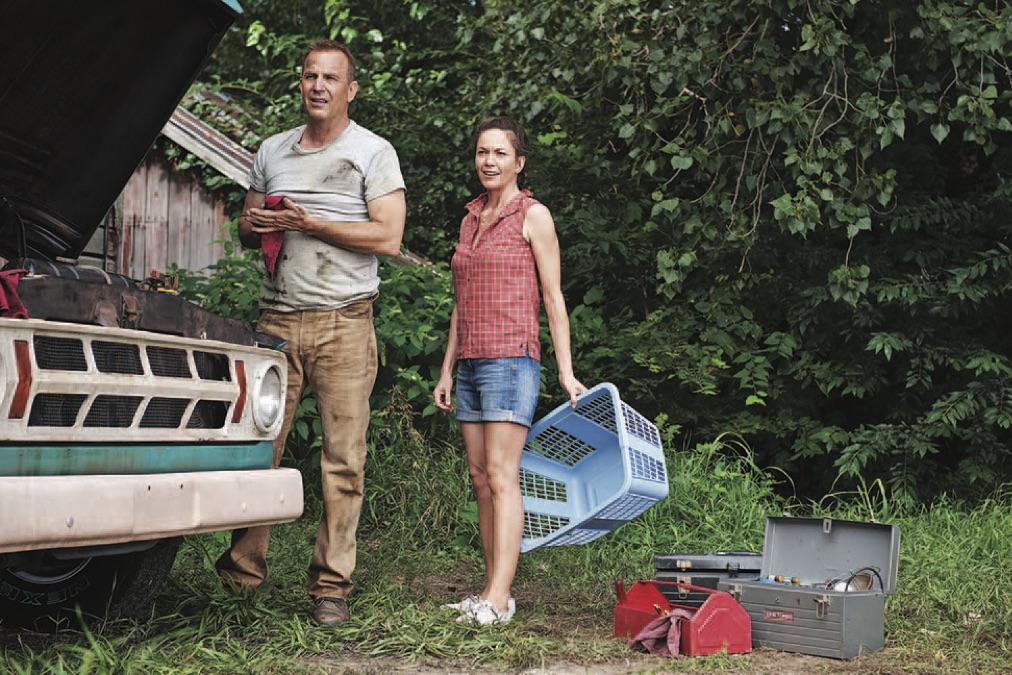 Costner as Jonathan Kent and Lane as Martha Kent in Man Of Steel.
Costner as Jonathan Kent and Lane as Martha Kent in Man Of Steel.
C&I: But still, even though the two of you are evenly matched here, you could make an argument that you are the movie’s protagonist. George reluctantly goes along with you — reluctantly, that is, probably because he’s a retired lawman, and he knows how family squabbles like this can turn out. And he comes through when the chips are down. Yet Margaret is the one who truly drives the story, and her husband, with her obsession. For better or worse.
Lane: Maybe. But categorizing someone as a protagonist is like trying to find the first domino in the line. Here, you have the dance of a husband trying to bring peace to his wife’s heart. I mean, one person in a relationship can comprehend loss and be able to go forward in life with a modicum of peace, whereas the other person cannot achieve peace with that loss. I mean, clearly she’s projected onto the grandchild the loss of her son. So the grandchild embodies a connection to her dead son, and rightfully so. But I also feel that the generosity of heart that Kevin possesses in himself makes him perfect for his character, because of the level of sacrifice, the level of commitment, George has.
C&I: You do quite a bit of riding in Let Him Go, which you haven’t done in many other films. In fact, except for Cattle Annie and Little Britches and Lonesome Dove, which were westerns, we haven’t seen you in the saddle much at all.
Lane: That’s true. And it’s always an interesting situation, because whenever you have an actor on a horse, you have to insure them for the entire value of the project. I mean, they could continue filming if, God forbid, the director became unwell or something. But if one of your actors has an accident and can’t film, you’ve really screwed the pooch. So you really have to practice, because by insurance company standards, anything you do with a horse, any time you ride a horse, is considered a stunt. They figure that’s a lot of power underneath your leading lady. They consider just being near a horse a stunt in terms of insurance.
In fact, sometimes, you practice what you’re going to be doing in the film, and then you get to the set and they say, “Oh, no. Actually, we’re not going to let you run on the horse.” And you’re like, “What do you mean? I’m all polished and proud and I can jump off the saddle and do what’s asked of me.” It’s disappointing, but you realize it’s a very rare circumstance where an actor is allowed to do very much on a horse. And it’s funny: What constitutes a stunt on a set is not necessarily what you imagine it to be.
C&I: But you managed to ride tall here.
Lane: You know, if you’re going to shoot a film in Calgary, you can be 80 percent sure there are horses involved in the story. And everybody giggles, and it’s sweet, and it’s just the way it is — because the landscape and the beauty around that area is still available in its natural form to film. In this case, I was happy to see that the lady who would really do the riding in the wide shots was Jerri Duce. My hat is off to her for the rest of my days. I mean, she’s just an epic stunt rider — I think she was the first woman to get into the Cowboy Hall of Fame — and she teaches the craft that she practices. She became friends with me because she was the one who would practice ride with me. I had such a ball knowing what she was capable of. I mean, it was like taking a Ferrari and going around the block with it with her, because she’s capable of so much.
It’s so funny: I would get to do something that I had practiced, but I would only get to do it twice on cameras. And I’d be like, “Really? That was like two times, 20 seconds. That’s all I get?” But it’s on film forever. If it were up to me, I’d still be there doing it, because I love horses so much.
And I was lucky here to have a good relationship with my horse. I call it a fringe benefit. It was better than riding sidesaddle. And much better than in Lonesome Dove, where I was in a corset and a petticoat. Or on Cattle Annie and Little Britches. There, I was the third person on the horse with Amanda Plummer and John Savage. I was the sucker who was stuck on the withers. Let me tell you, it’s no fun to ride in 100 degrees in Mexico, down a mountain on a horse’s withers. You never forget that.
Q&A: Kevin Costner
The Oscar winner holds forth about playing a wary-but-supportive retired sheriff in Let Him Go.
 Kevin Costner in Let Him Go.
Kevin Costner in Let Him Go.
More often than not — a lot more often, really — Kevin Costner effortlessly assumes the take-charge role in any film or TV scenario. Whether he’s mentoring an undisciplined baseball rookie (Bull Durham), or proving himself worthy of acceptance as a fellow warrior by a Sioux tribe (Dances with Wolves), or authoritatively exerting mastery of his land and legacy as a modern-day Montana cattle rancher (Yellowstone), there’s rarely any doubt about who’s at the wheel when it comes to driving the plot.
But in Let Him Go, the suspenseful drama written and directed by Thomas Bezucha (The Family Stone) and based on the novel by Larry Watson (Montana 1948), Costner is less a resolutely decisive leader than a reluctantly led partner. Specifically, he plays George Blackledge, a retired sheriff turned rancher in 1950s Montana who joins Margaret (Diane Lane), his strong-willed wife, on a perilous journey to the Dakotas to retrieve their young grandson, who has been spirited away by their late son’s widow and her new husband and taken with them to the homestead of the husband’s notoriously intimidating kinfolk.
“It’s a real dilemma for me as George,” Costner told C&I during a recent interview, “because I see what could be the outcome of her decision to go after them. And it scares me because I love my wife too much to let her be in harm’s way alone. But I know there’s enough danger there to take us all down.”
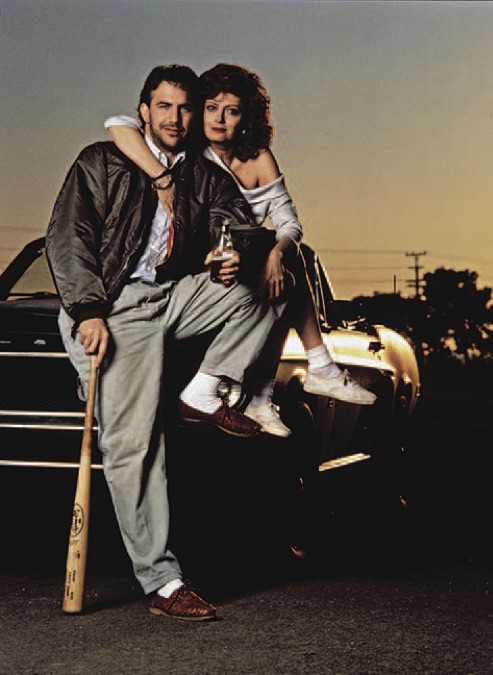 Costner in Bull Durham.
Costner in Bull Durham.
Also covered in our conversation:
Cowboys & Indians: What was there that attracted you to Let Him Go?
Kevin Costner: I think it was that, early on, I saw this as a thing where you realize that, sometimes, you have to go down this path with someone you love so much, to do something that they’re so compelled to do — and you know it’s wrong. Everything in your body is saying it’s wrong. Everything in your mind, your experience, is saying this is wrong. You understand emotionally why she’s doing it. But at the end, the logic of human behavior is abandoned.
I mean, she doesn’t feel she’s being irrational. She’s just being driven by love. Her grandson, this young life, is not going to be in the right hands. And there’s me sitting on the other side saying, “Sometimes being right doesn’t matter.” And then it ends up destroying their life. I think sometimes men do end up following their women. If women aren’t careful, they can drag their men into very serious things.
C&I: It may not be immediately apparent while you’re immersed in the movie. But wouldn’t you agree that, when you replay it in your mind afterwards, you might see that Margaret has a lot in common with Blanche, the head of the family that gains control of your grandchild?
Costner: Their wills, their desires, their sense of protectiveness or purpose or whatever you want to call it — yeah, they could be put in the same bucket. But they’re separated wildly by their ethics and morals.
C&I: There’s no indication that George is or ever has been a weak man. Indeed, he’s a retired sheriff, so he’s likely no stranger to violence or dangerous situations. And that probably makes him even more aware of the risk he and Margaret are taking when they try to retrieve their grandchild. But still…
Costner: There’s not any guy who wouldn’t know this is a bad situation. And yet she doesn’t know or want to know what she’s doing. She’s going to get her man into a fight. With people that fight to the death. That’s what she’s doing.
It’s like the first time I watched Moby Dick. I was young and that movie scared me. And I didn’t know why it scared me. And then somebody said the word to me: “This guy was obsessed.” And I said, “What’s obsession?” And I was told it’s a willingness to take everybody down because of your own position. Ahab wanted that whale so badly that he put his crew in this position. He didn’t care anymore.
I’m not saying that Margaret doesn’t care anymore. But she’s obsessed. I think that’s going to spur a little bit of discussion for men and women who watch. Maybe while they’re driving home. Or if they don’t see it in a theater, maybe in their living room. Wherever they are, they’ll go, “Didn’t she see? He knew right away where this was going, where it could go. Why didn’t she see?”
C&I: You and Diane Lane were well-matched and thoroughly persuasive as Superman’s adoptive parents, Jonathan and Martha Kent, in Man of Steel. But you’re even more compelling together here because the threat is more realistic and the mortal stakes are much higher. Did you have much rehearsal time to work out backstories for your characters?
Costner: Oh, yes, she’s a very good rehearsal partner. And she’s a really good partner on the set, too. She’s just very supportive of other people, and she’s protective of the process. She knows how to stand up for herself. And she knows that there’s people standing with her. And she loves to act. She’s one of our great actresses. There’s no question about it. She is one of five in the world.
C&I: And yet, to a large degree, she’s underrated. It’s almost as though, every few years, people have to rediscover how great she is all over again.
Costner: Well, that’s because she takes on roles and assimilates into them, and that forces people to re-examine her. She’s not a person who is built to repeat herself. She understands that we all have to do that to a certain extent, but she is really gifted. And she’s still a romantic, leading woman. She can play a grandma, but she doesn’t need to. What I mean is, she can play the grandma in one film, but she still can be a romantic woman in another screenplay. She can take on that persona, too. That’s not easy. She’s just great.
C&I: And better still, as this movie proves — she can ride a horse.
Costner: [Laughs.] Yeah. She got up there and did it.
Photography: Images courtesy Kimberley French/Focus Features, Entertainment Features/Alamy Stock Photo, Moviestore Collection LTD, Picturelux/The Hollywood Archive, Orion Pictures/Greg Gorman, Paramount Pictures
From our August/September 2020 issue.







